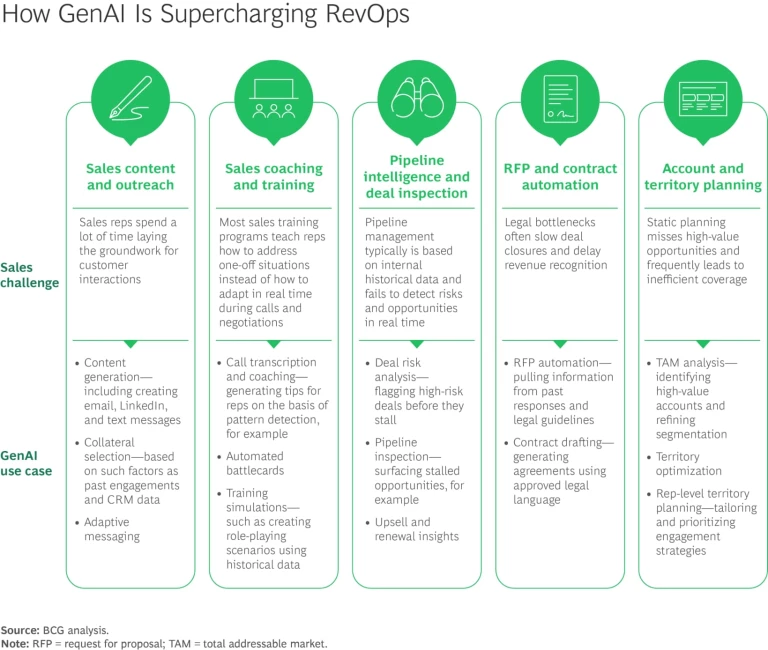RevOps integrates—and helps align—functions across the revenue life cycle, including sales, marketing, and customer success. For years, predictive AI has been a RevOps enabler, helping teams refine customer segmentation, forecast churn, and optimize sales strategies. But by tapping GenAI and agentic AI, companies have an opportunity to step things up, moving beyond prediction and into autonomous execution. First movers are accelerating deal cycles, improving decision making, and achieving higher revenue growth.
The So What
Predictive AI is now table stakes for driving successful go-to-market outcomes. But it also leaves the table half set. New AI technologies—GenAI and agentic AI—can automate workflows, assist sales professionals, and personalize customer engagement at scale. Used wisely, these technologies can revolutionize RevOps.
Stay ahead with BCG insights on marketing and sales
GenAI makes AI’s insights more actionable. For example, instead of AI simply identifying products that a customer may like, GenAI can create talking points for a sales call and coach reps in real time. Already, investments in GenAI are delivering value. Companies have cut request for proposal (RFP) turnaround times, for instance, by up to 20%.
Agentic AI unlocks even more value. Autonomous AI agents can execute tasks, even complex ones, on their own. They don’t replace sales teams but streamline workflows, freeing up sales professionals for high-impact work. Among the functions agentic AI can shoulder: scheduling follow-ups, tracking deals, and even handling early-stage customer interactions.
GenAI in Action
Our work and discussions with industry leaders reveal not just where but also how GenAI is supercharging RevOps. (See the exhibit.)
- Expediting Sales Content and Outreach. By assisting with critical but time-consuming groundwork—creating personalized emails, recommending collateral, and optimizing pitch style—GenAI lets sales teams engage more efficiently with customers.
- Providing Sales Coaching and Training. GenAI analyzes sales interactions—even in real time—to provide tips and personalized coaching. It creates role-playing scenarios for training and sales battlecards for live engagements.
- Improving Pipeline Intelligence and Deal Inspection. By analyzing live-deal activity and signals using third-party data, GenAI flags high-risk deals, improves pipeline accuracy, and highlights opportunities to expand beyond the original scope of the deal.
- Automating RFP and Contract Workflows. GenAI speeds deal execution by generating RFPs (pulling from past responses, legal guidelines, and other relevant material) and drafting contracts (using preapproved legal language).
- Accelerating Account and Territory Planning. By processing both structured and unstructured data (such as notes and call transcripts from CRM systems), GenAI uncovers underpenetrated areas, finds white-space opportunities, and optimizes territory design.

Adding Agentic AI
Agentic AI may be more nascent than GenAI, but its special sauce—optimizing activities through autonomous execution that leverages live data—is well suited for RevOps. The use cases that leading companies are piloting include:
- AI-Powered Sales Assistants. AI agents schedule follow-ups, track deals, and execute CRM updates—maintaining clean, up-to-date information.
- Autonomous Lead Management. Agentic solutions identify, qualify, and nurture leads, ensuring that sales teams focus on high-value prospects.
- Self-Optimizing Sales Cadences. AI agents continuously refine outreach strategies—adjusting timing, messaging, and engagement tactics.
- Agentic Sales Representatives. Agentic AI handles early-stage customer interactions, including product education and basic negotiations.
Now What
Savvy companies are implementing GenAI while, at the same time, laying the foundation for effective scaling and autonomous execution via agentic AI. To get this right, leaders are prioritizing the following steps:
- Getting Data—and Governance—Ready. Ensuring the quality and accessibility of data (about customers, sales, and the pipeline) is critical for AI-powered analysis and automation. So are policies and processes—like responsible AI—that drive appropriate and secure use.
- Standardizing Sales and RevOps Processes. Standardization makes it easier to optimize workflows with AI and creates the right conditions for agentic solutions to handle parts—or even all—of a workflow.
- Developing a Unified Platform Strategy. Companies that get AI right don’t deploy a patchwork of siloed solutions. Instead, they develop a cohesive platform strategy, with solutions sharing infrastructure and a consistent user experience.
- Focusing on Value. By prioritizing use cases that quickly—and visibly—deliver impact, companies not only realize value from AI but also build support for more ambitious efforts. Sales content, forecasting, and deal execution are good places to start.
- Testing and Learning. AI leaders stress continuous iteration and feedback. They experiment with AI-powered processes and evolve solutions on the basis of real-world usage. By doing so, these companies position themselves to scale quickly as capabilities—and opportunities—develop.
- Empowering People. Robust change management—integrating tools into workflows, creating a high-performance culture, and building trust in AI insights—brings out the best in people and technology. And while training can develop the talent you have, savvy companies also invest in new talent, adding AI-fluent expertise to RevOps teams.
The time to start is now. Organizations that embrace the new wave of AI will build faster, smarter, and more scalable revenue teams. They’ll realize the full potential of their data, the full promise of their people, and—crucially—a lasting competitive advantage.






